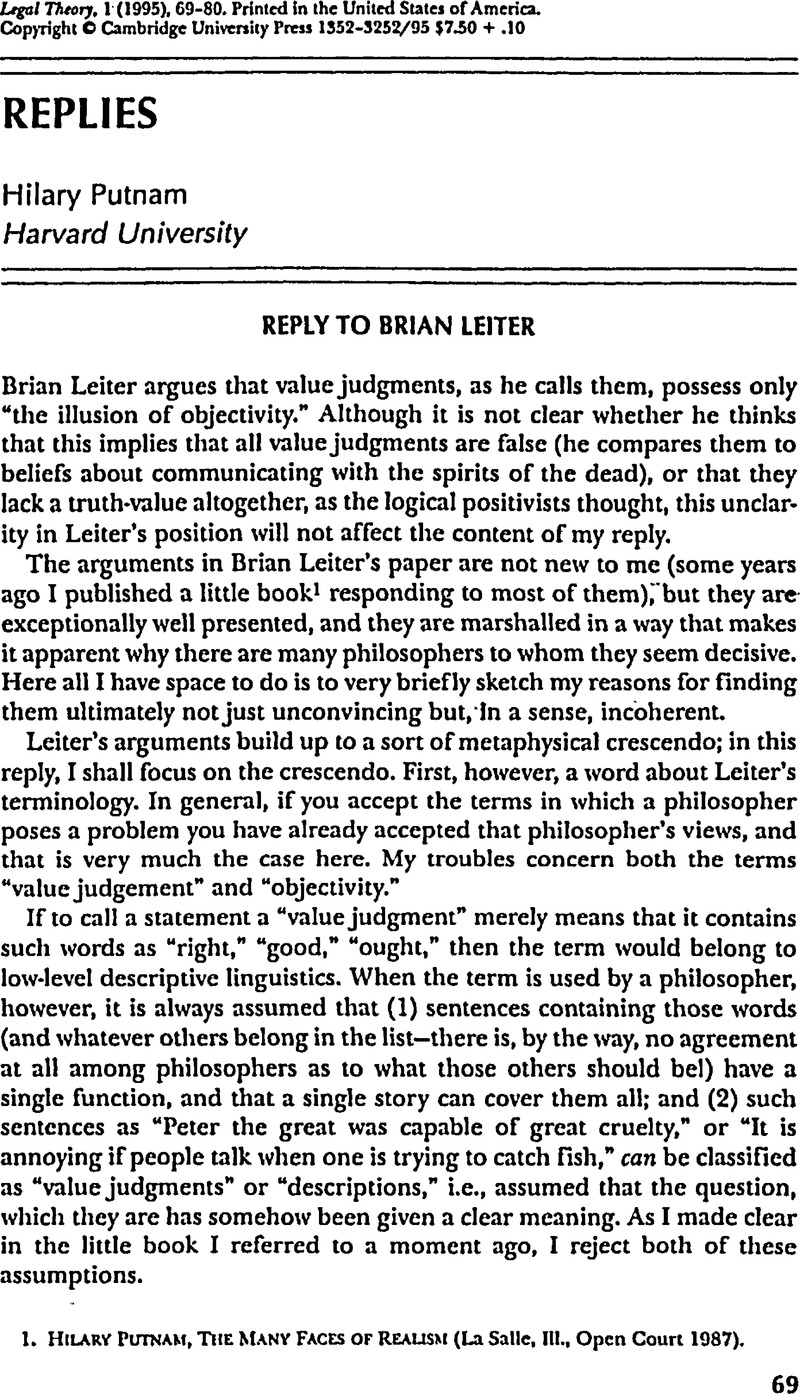No CrossRef data available.
Article contents
Replies
Published online by Cambridge University Press: 13 February 2009
Abstract

- Type
- Discussion
- Information
- Copyright
- Copyright © Cambridge University Press 1995
References
1. Putnam, Hilary, The Many Faces of Realism (La Salle, Ill., Open Court 1987).Google Scholar
2. Even in the case of “subjective” statements, however, there is a possibility of error, I may decide I was wrong, even in a judgment about how things taste to me, or about what is pleasant or annoying to me, etc. We do not have privileged access even to the “subjective.”
3. In addition to rejecting this way of preitructuring the debate, I go on to argue, in my reply to Coleman, that the sense of “objectivity” involved in these supposed alternatives is already a confused one.
4. I wish to emphasize that this is only a sufficient condition, and by no means a necessary one. “Value judgments” are not a homogeneous class, and different sorts of judgments possess very different sorts of “objectivity.” But the sort of judgment I describe here is one of those with which Dewey was concerned.
5. An analogy may be helpful here: Wittgenstein showed in Philosophical Investigations that if we search for “real properties” (in Letter's sense) to correspond to the correctness or incorrectness of following even as simple a rule as “add two,” we will not find them—yet Wittgenstein was not (pate Saul Kripke) being a skeptic about rule following: he was, rather, telling us that that is not the way to understand the objectivity of rule following.
6. Although Dcwey's use of the term “men” to mean “human beings” may, by present standards, seem “sexist,” a glance at Dewey's writing will show that he was a staunch and consistent critic of male chauvinism. See, for example, the 1908 Etiiics (with Tufts).
7. My present view is set out in my Dewey, Lectures, “Sense, Nonsense, and the Senses,” 91 J. Phil. (1994).Google Scholar
8. Cf. Philosophical Investigations § 154Google Scholar, for example. Note that in this paragraph Wittgenstein urges us to look not at empirical processes but at circumstances which justify saying that a rule has been followed correctly, i.e., to relate the normativily of rule following to the normativity of justification, not to the kinds of causal constraint that can be a part of physical or mental process.
9. I discuss the passages in which Wittgenstein does this in some detail in “The Faces of Cognition,” the third of the lectures cited in note 7.
10. At the AALS meeting in January 1994, Colcman described Dworkin as a “metaphysical realist”: I believe that I succeeded in convincing Colcman that, on the contrary, Dworkin sees himself as a deflationist (a Fregcan or Wittgenstemian rather than a Rortian one, I am sure).
11. However, in my AALS lecture (reprinted here), to which Coleman and Leiter are replying, I argue that Rorty fails to inquire into the character of this “impossibility,” and that this is what leads him to recoil from metaphysical realism into an equally metaphysical antirealism.
12. This is not to say that it is trivial to reconcile bivalente with the fact that, in ordinary language, questions like “Who is the tallest kid in the class?” or “Which is the most reasonable decision in this case?” may have no right answer. In fact, it requires the Theory of Descriptions (developed by Bertrand Russell) to provide a formal way of doing it. On that theory, when two or more kids are “tallest,” say John and Bill, both statements, “John is the tallest kid in the class” and “Bill is the tallest kid in the class” are false (thus preserving bivalence). Similarly, if two decisions are tied for the position of “right answer,” a mathematical logician would say that “A is the right answer” is false, and “B is the right answer” is also false, again preserving bivalence.
13. In a famous passage (Philosophical Investigations § 107) Witgenstein compares formal logic to a floor which has been so smoothly polished that it is impossible to stand on it!
14. See the reference in my paper to Richard Heck's demonstration of a fallacy in the supposed proofs that second-order vagueness is inconsistent.
15. This is especially prominent in Rorty, Richard, Contingency, Irony, Solidarity (1989)Google Scholar.
16. Id. at 6.
17. However, I do not say, and my paper very deliberately did not say, that “warranted assertability under appropriate conditions” is the truth predicate in the case of ethical and legal statements. The truth predicate is, as I indicated above, disquotational in all cases; but (I agree with Dworkin), the very substance of a moral or legal claim is best understood as a claim that there are reasons that a well-informed person or good judgment could appreciate for doing or deciding or valuing in a certain way. Most claims are, by their very nature, not concerned with anything recognition-transcendent; but that does not mean that the truth predicate has a different meaning when applied to them. Also, I am utterly baffled as to what Coleman is thinking of when he writes that “for [Putnam] warranted-assertability-un-der-appropriate-conditions is the applicable notion of truth in a domain only if participants in that domain are actually in suitably good epistemic conditions” (emphasis in the original).
18. In Philosophy and the Mirror of Nature.
19. Cf. note 1.
20. I say “Coleman-Leiter” because I gather from Colcman's paper that he and Leiter are in agreement here.
21. I neglect the possibility of someone's learning the word “mountain” by having it defined in terms of other notions which have observational import—ultimately our concepts must connect to what we can observe if our thought is to have bearing on reality at all.
22. As John McDowell has remarked, it is not clear that Plato himself was a rampant Platonist!




